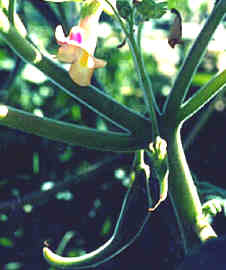
Plant Description
Caution & Interaction

Latin (botanical) name:
Harpagophytum procumbens
Common names: Devil's Claw,Grapple Plant, Wood Spider
Plant Description: Devil's Claw is a plant that is found in large parts of Southern Africa, primarily in the Kalahari Sands of Namibia, Botswana, South Africa, Angola and to a lesser extent, Zambia and Zimbabwe. Its tubers grow off its tap root and are shaped like elongated sweet potatoes. From the flowers grow woody, sharply curved, sticky, barbed fruits, which give Devilís Claw its name. The plant spreads about 18" and has tubular pinkish white flowers which may have purple or yellow spots. The leaves are large and heart-shaped. Although the name comes from the fruit, the part of the plant used for its medicinal value is the tuber.
Medicinal Properties & Uses: Devilís Claw Tuber is primarily known for use in the treatment of arthritis. It contains three important constituents belonging to the iridoid glycoside family: harpagoside, harpagide, and procumbide. The secondary tubers of the herb contain twice as much harpagoside as the primary tubers. As such, these secondary tubers contain the preferable concentration of active ingredients. In addition, Devil's Claw contains beta sitosterol, which, along with harpagoside, possesses anti-inflammatory properties, anti-rheumatic, and analgesic properties, which help alleviate chronic muscle and joint aches, such as found in fibromyalgia. It can be used for long term joint pain, new joint pain, and pain from overuse. Devil's Claw also has sedative properties for inducing sleep, and diuretic properties to assist in the production of urine. These properties have been recognized by the British Herbal Pharmacopoea, and some clinical studies have shown that it is, indeed, effective in reducing inflammation. Devil's Claw is also considered by herbalists to be a potent bitter. Bitter principles, like the iridoid glycosides, stimulate the stomach, increasing gastric digestive enzymes which aid in protein and fat digestion. It has been known to help reduce cholesterol and uric acids in the blood. The German Commission E, an expert panel of physicians and pharmacists who advise Germany's counterpart of the U.S. Food and Drug Administration, approved the use of Devil's Claw for loss of appetite, dyspepsia, and degenerative disorders of the locomotor system. Devil's Claw is also used externally as an ointment to treat skin rashes and wounds.
Dosage: 30-60 drops in water or juice, 2-3 times daily, or as needed. Shake well before using.
Cautions & Interactions: Gastric and duodenal ulcers. Keep out of reach of children.
Efficacy Studies & Other Clinical Data:
Disclaimer (U.S. Only): These statements have not been evaluated by the FDA. These products are not intended to diagnose, cure, treat, or prevent any disease.
Common names: Devil's Claw,Grapple Plant, Wood Spider
Plant Description: Devil's Claw is a plant that is found in large parts of Southern Africa, primarily in the Kalahari Sands of Namibia, Botswana, South Africa, Angola and to a lesser extent, Zambia and Zimbabwe. Its tubers grow off its tap root and are shaped like elongated sweet potatoes. From the flowers grow woody, sharply curved, sticky, barbed fruits, which give Devilís Claw its name. The plant spreads about 18" and has tubular pinkish white flowers which may have purple or yellow spots. The leaves are large and heart-shaped. Although the name comes from the fruit, the part of the plant used for its medicinal value is the tuber.
Medicinal Properties & Uses: Devilís Claw Tuber is primarily known for use in the treatment of arthritis. It contains three important constituents belonging to the iridoid glycoside family: harpagoside, harpagide, and procumbide. The secondary tubers of the herb contain twice as much harpagoside as the primary tubers. As such, these secondary tubers contain the preferable concentration of active ingredients. In addition, Devil's Claw contains beta sitosterol, which, along with harpagoside, possesses anti-inflammatory properties, anti-rheumatic, and analgesic properties, which help alleviate chronic muscle and joint aches, such as found in fibromyalgia. It can be used for long term joint pain, new joint pain, and pain from overuse. Devil's Claw also has sedative properties for inducing sleep, and diuretic properties to assist in the production of urine. These properties have been recognized by the British Herbal Pharmacopoea, and some clinical studies have shown that it is, indeed, effective in reducing inflammation. Devil's Claw is also considered by herbalists to be a potent bitter. Bitter principles, like the iridoid glycosides, stimulate the stomach, increasing gastric digestive enzymes which aid in protein and fat digestion. It has been known to help reduce cholesterol and uric acids in the blood. The German Commission E, an expert panel of physicians and pharmacists who advise Germany's counterpart of the U.S. Food and Drug Administration, approved the use of Devil's Claw for loss of appetite, dyspepsia, and degenerative disorders of the locomotor system. Devil's Claw is also used externally as an ointment to treat skin rashes and wounds.
Dosage: 30-60 drops in water or juice, 2-3 times daily, or as needed. Shake well before using.
Cautions & Interactions: Gastric and duodenal ulcers. Keep out of reach of children.
Efficacy Studies & Other Clinical Data:
-
Positive Health Medicine Magazine - Devil's Claw for Osteoarthritis
- Double-Blind Trial - Devil's Claw
Disclaimer (U.S. Only): These statements have not been evaluated by the FDA. These products are not intended to diagnose, cure, treat, or prevent any disease.